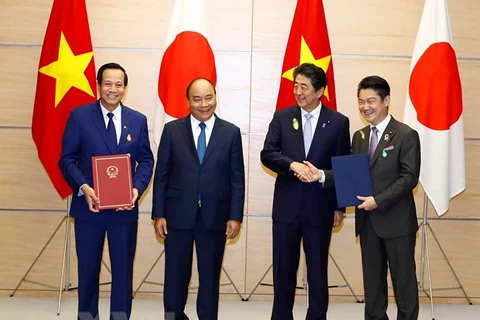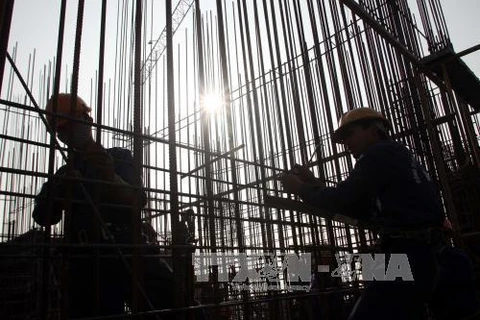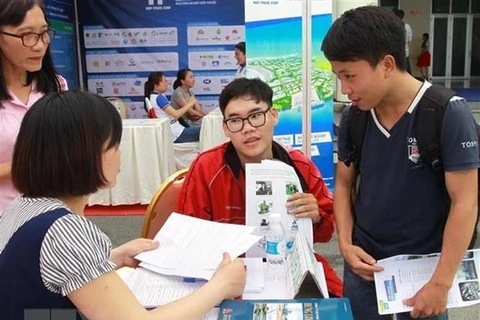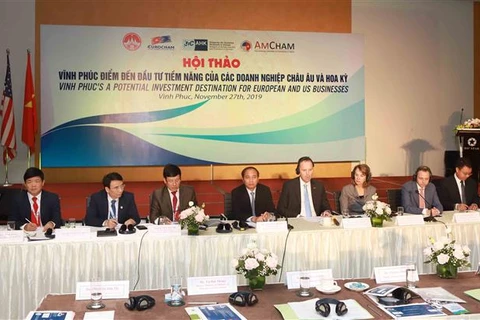 Workers in Binh Son district, the central province of Quang Ngai, participate in a high-tech welding apprenticeship at DooSan Vina Training Centre in Dung Quat Economic Zone. (Photo: VNA)
Workers in Binh Son district, the central province of Quang Ngai, participate in a high-tech welding apprenticeship at DooSan Vina Training Centre in Dung Quat Economic Zone. (Photo: VNA) Only about 11% of the domestic labour force is highly skilled while 26% are trained workers with degrees and certificates, reported the Ministry of Labour, Invalids and Social Affairs.
After years of economic reform, the labour force has doubled, from 27 million in 1986 to 51.4 million in 2022. Vietnam’s population is in the “golden age” but the quality of labour is "not yet golden", as the rate of trained labourers is still low, according to a ministry official.
The Vietnamese labour market has an excess of low-skilled people and a shortage of high-tech workers.
Skill limitations make it difficult for Vietnamese workers to switch jobs, especially during the COVID-19 pandemic, while the social welfare service is not strong enough to help workers overcome difficulties.
If training does not improve, Vietnamese workers will increasingly lose their competitiveness.
According to Nguyen Xuan Son, executive director of Manpower Group Vietnam, only 8.96% of Vietnamese workers have the ability to work remotely in the context of businesses increasing this type of work after the pandemic.
High-skilled workers still need to improve both professional and soft skills.
Notably, only 5% of workers have English proficiency, which is not enough to compete with regional workers.
The average income of Vietnamese workers is about 300 USD, much lower than workers in the region at 1,992 USD and the world at 2,114 USD.
According to Son, "cheap" labour is not only an attraction but also a weakness of Vietnamese workers when foreign enterprises put new technologies into practice.
A recent survey showed that about 57% of enterprises face difficulty in recruiting high-quality human resources.
Many businesses express concern about the shortage of high-quality human resources, as they are in need of recruiting thousands when expanding production.
Nguyen Viet Quang, the CEO of Vingroup, said that in the next two years, his business would need about 100,000 employees, of which 20% are senior personnel who have received at least university degrees.
The Government should soon have policies to support enterprises in recruiting and training high-quality personnel.
In the long term, enterprises, through the existing education system and their business activities spreading across the country, would be ready to support personnel training, Quang said.
Meanwhile, PouYuen, one of the largest export sports shoe manufacturers in Ho Chi Minh City, is having difficulty recruiting after it lost about 5% of workers after the pandemic.
Thai Van Tong, the CEO of PouYuen, said that in the coming time, his company would promote production automation and data digitisation processes that would require a large number of skilled and high-qualified workers in the fields of mold engineering, automation and information technology.
In the context of a shortage of skilled workers, Tong suggested that the Government should create favourable conditions to connect with vocational training schools and invest more resources in the southern provinces to create skilled human resources.
From the authorities' perspective, chairman of the People's Committee of Bac Giang province Le Anh Duong said: “General education in the past time has been invested in and achieved many positive results while vocational education has not yet been paid proper attention and that has led to a shortage of skilled workers.”
“Therefore, Bac Giang Province identifies improving the quality of human resources and developing an integrated labour market as one of the necessary breakthroughs,” said Duong.
“We focus on promulgating mechanisms and policies on vocational training and education, forecasting labour supply and demand, supporting enterprises to recruit workers, ensuring social security policies for the wave of migrant workers,” he said.
“Among more than 300,000 employees working in industrial parks (IZs), up to one third are migrant workers, so the province pays attention to solutions to develop a sustainable labour market,” the chairman said.
Duong also suggested that it was necessary to have connection between general and vocational education.
"The fact is that at present, the general education goes in-depth but vocational education has not been properly developed."
“Mechanisms and policies for teachers of education facilities also need to be similar. Along with that, it is necessary to have a policy on vocational training for children of ethnic minorities so as to achieve the dual goals of raising the people's intellectual level, creating jobs for rural workers, and sustainable poverty alleviation."
Dr. Juergen Hartwig, a representative of the German development agency, GIZ, said that Vietnam’s development opportunities would depend on the quality of workers.
Human resources are the key to the country's labour productivity. The market structure is changing at a rapid pace, requiring more skill types. Therefore, Vietnam must have flexible policies, according to the representative.
To develop a sustainable labour market, the Prime Minister assigned the Ministry of Labour, Invalids and Social Affairs to soon draft a resolution on developing a labour market that has efficiency, flexibility, modernity, sustainability and integration.
It has to focus on solutions to raise awareness about the labour market and consider labour as a special commodity in order to have appropriate mechanisms and policies and labour mobility, and to comprehensively reform the vocational training and education system.
Vocational training should be comprehensively renovated in an open, flexible and effective way to improve the quality of human resources, take advantage of the opportunity of the so-called “golden population structure" serving the process of economic restructure, industrialisation and modernisation of the country in the context of the Fourth Industrial Revolution./.
VNA























